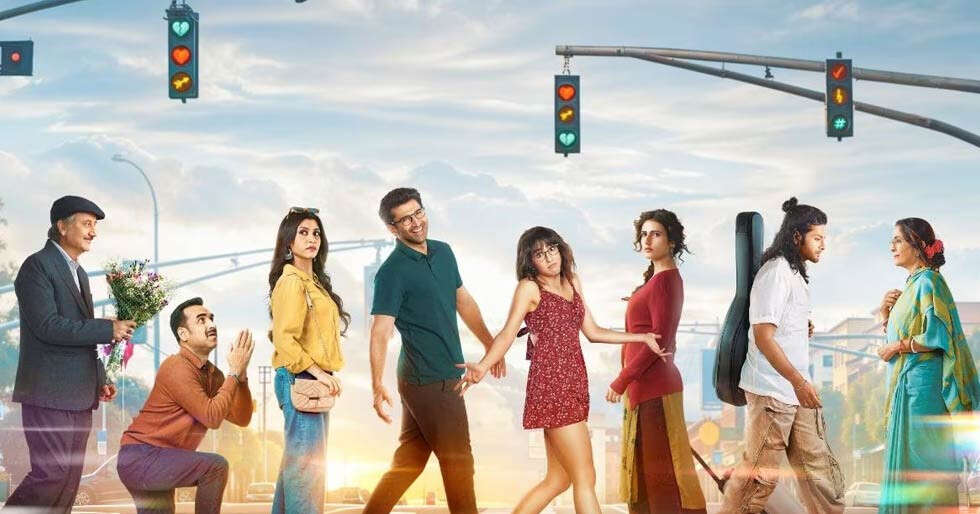Shivani (Neena Gupta) lives in Pune with her husband Sanjeev (Saswata Chatterjee). Their elder daughter, Kajol, is married to Monty (Pankaj Tripathi), and they have a 15-year-old daughter. Shivani’s younger daughter, Chumki (Sara Ali Khan), works at a corporate office in Delhi and is engaged to a colleague. Meanwhile, Parth (Aditya Roy Kapur) is a travel vlogger who shares a close friendship with Akash (Ali Fazal), a struggling musician, and his wife Shruti (Fatima Sana Shaikh). In Kolkata, we meet Parimal (Anupam Kher), a retired man who lives alone and is looked after by Jhunuk (Darshana Banik), the fiancée of his late son. Parimal and Shivani were once close, college mates who shared a love for theatre before life pulled them apart.
Akash quits his corporate job in Bangalore to chase his musical dreams in Mumbai. Shruti, to support him financially, moves to Delhi to work as a TV reporter. During a trip to Bangalore, Chumki gets drunk and is helped by Parth. Meanwhile, Monty starts an online affair after being influenced by a colleague’s extramarital escapade. When Kajol discovers this, she walks out, feeling deeply betrayed. The couple later head to Goa to mend fences, but the trip only complicates things further.
Disillusioned by her mother and sister’s less-than-perfect relationships, Chumki begins to doubt her own impending marriage. She starts following Parth’s blog and eventually connects with him in Delhi. His theatre therapy sessions help her deal with her inner turmoil, including a lecherous boss and an indecisive fiancé. Meanwhile, Shruti discovers she is pregnant and isn’t sure if she wants to abort. She also finds herself drawn to a colleague who is a single father. Akash, spiralling in both career and personal life, suspects Shruti of having an affair with Parth. Shivani, on the other hand, reconnects with Parimal during a college reunion in Kolkata and ends up helping him out of a delicate situation, rekindling a bond long dormant.
One unique element of Metro… In Dino is the presence of the Metro Band, Pritam, Papon, and Raghav Chaitanya, who perform from start to finish, essentially becoming musical narrators and giving the film its soulful rhythm and flavour. Though sometimes, their presence dulls the impact of what the actors are trying to achieve.
While the film is elevated by its performances, it falters due to a somewhat muddled and inconsistent plot. Some storylines feel undercooked or implausible. For instance, why is Shruti working at a bookshop in Mumbai when, as a trained journalist, she could easily continue in her own field? Why does Parth, a self-declared nomad, suddenly settle for an arranged marriage, with a woman we never even meet? Why doesn’t Parimal have a more meaningful conversation with Jhunuk and help her carve out her own future? The heightened theatricality of that subplot feels misplaced. And the film’s nod to Dilwale Dulhania Le Jayenge in the climax feels indulgent.
Among the various tracks, the one featuring Konkona Sen Sharma and Pankaj Tripathi stands out. Despite its eccentricities, it conveys a genuine message about giving love a second chance. Both actors, with their natural flair, shine in their roles. Sara Ali Khan’s portrayal of a confused 20-something evolving into a woman with emotional clarity is also engaging. She’s given a well-written part and does complete justice to it.
The scenes between Neena Gupta and Anupam Kher, where they reminisce with their college batch of ’79, carry a gentle warmth and underline the message that life doesn’t have to dim with age. Gupta gets a substantial role, though her storyline becomes overly complex towards the end. Ali Fazal and Fatima Sana Shaikh are competent, but their characters suffer from a lack of depth. Their arc, based on miscommunication and emotional disconnect, feels dated, something we’ve seen far too often. Perhaps the failed musician narrative warranted its own separate film to be fleshed out meaningfully.
Saswata Chatterjee, despite limited screen time, delivers some memorable moments. One wishes for more interaction between him and Pankaj Tripathi, two men grappling with marital setbacks, who might have shared insight and support.
A particularly heartening subplot involves a teenage girl quietly exploring her sexual identity. It’s handled with humour and authenticity, one of those signature Basu touches that enrich his stories in small but impactful ways.
Is Metro… In Dino better than the 2007 original? Unfortunately, no. The earlier film boasted stronger storylines, better music, and the unmistakable presence of Irrfan Khan. While the new film has its flaws, Anurag Basu still manages to craft a romantic drama that doesn’t flinch from real emotions. In an era of half-hearted filmmaking, Metro… In Dino is an earnest attempt at genuine storytelling, something which most directors of today have become negligent about.
Also Read: Anurag Basu Reveals It Was Irrfan Khan’s Idea to Make a Sequel to Life In A…Metro

